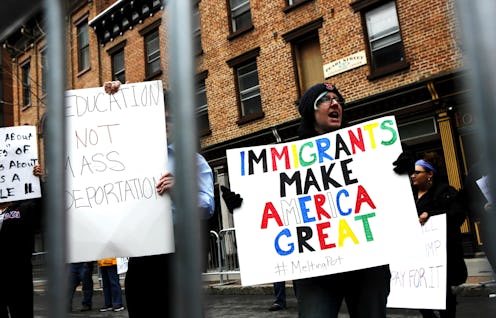News
The Surprisingly Bipartisan #NeverTrump Movement
With the first half of primary season behind us, it is clear that, though he is the Republican frontrunner, Donald Trump may not secure enough delegates to guarantee him the party's nomination in July. Increasingly, the focus of the race for Trump's contenders, Sen. Ted Cruz and Gov. John Kasich, has been keeping Trump from doing so, as opposed to winning themselves (which, at this point, is unlikely to happen in the primaries). So what is "Never Trump"? The candidates aren't the only ones taking this tack.
Never Trump is a number of different things unified by the same mission: Keeping Donald Trump from being the Republican presidential nominee. For starters, it's a pledge that over 24,000 people at the time of this writing have signed. It reads, simply:
We, the undersigned, will never vote for Donald Trump. We stand united to defend basic, common decency and Constitutional principles. And we will do our part to deny Donald Trump the Republican nomination and ensure that he never becomes Commander-in-Chief. Never means never.
For the most part, at least officially, "Never Trump" is a movement of Republican voters against the candidate. There's a NeverTrump Twitter account representing not only the "grassroots movement" against Trump, but also a political action committee (PAC) that has been set up not to get a particular candidate the nomination, but to keep Trump from getting nominated. #NeverTrump is also a hashtag people use to express their dismay with the candidate.
"Never Trump" can be broadened to include the movement of influential conservative voices that have tried to use their power to usher voters away from him. For example, prominent conservative radio show host Charlie Sykes has been railing against Trump in Wisconsin since the beginning of his candidacy. Before the Wisconsin primary, Sykes admitted to listeners that he didn't think Cruz was a particularly great option, but urged them to cast their ballots for the Texas senator with the explicit goal of keeping a win away from Trump. Cruz won the state by a near-landslide.
As far as Republican Party officials are concerned, their participation in the "Never Trump" movement is real, but less overt. Boldly, Sen. Marco Rubio tweeted the #NeverTrump hashtag several times in February, but was fairly quick to clarify that he meant he only wouldn't vote for Trump in the primaries; if Trump were to clinch the nomination, Rubio admitted he'd vote for Trump against a Democratic nominee.
Republican Party officials are skirting a delicate line here. Though they may oppose Trump, they also have to keep in mind that if he's the eventual nominee, they'll be pressured to back him or else betray their party. They also don't want to face a revolt from Trump supporters by being perceived as actively working against their candidate. The delicacy of this line was highlighted by the controversy that broke out after the Colorado GOP's twitter account released a #NeverTrump tweet shortly after Cruz won big in the state's caucuses. State party officials insisted that an unauthorized user posted the tweet, and they spoke out against it.
More than twice as many elected officials of the party have endorsed Cruz than Trump as of the beginning of April, despite the fact that Trump leads significantly in terms of primary votes. Though they may not be saying "Never Trump" explicitly, it's clear that most of them hope for a different nominee.
"Never Trump" is a not-surprising movement against a very anti-establishment candidate, explicitly perpetuated by voters and more implicitly supported by some members of the Republican establishment to keep Trump from securing the nomination.
